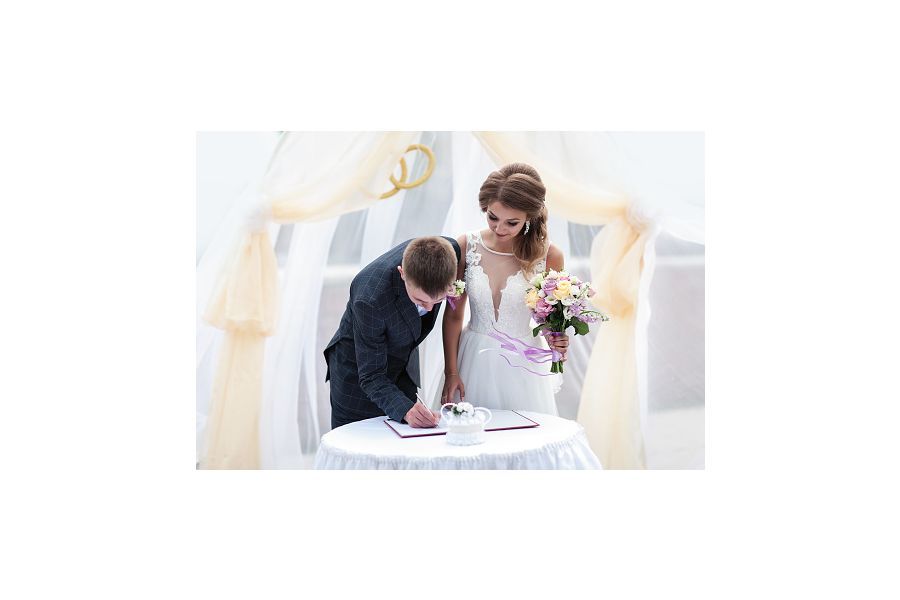Answered: 5 Questions About the Wedding License

White dresses, colorful bridesmaids, fondant-covered cakes and cover bands – these delightful details might be the building blocks of a wonderful wedding, but none of them have anything to do with whether or not you’re officially married. In fact, you don’t need a wedding at all. The only thing that allows you to be legally married in the eyes of the United States government, is your marriage license.
That said, it is very important to note that specific requirements for marriage licenses differ from state to state, sometimes even county to county, so be sure to check with the county clerk’s office in the county in which you will be married, months in advance.
But as an early wedding present, here’s a little cheat sheet for what you should have in mind before you make that call.
1. Who needs to go get it?
Although some states allow couples to pick up a marriage license from a county clerk’s office and fill it out at home, generally both bride and groom need to be present when the license is submitted, and occasionally an additional witness is required as well. But in some states, the bride and groom actually have to fill out and sign the license in the presence of the county clerk.
“Here in La Crosse County, Wis., we have an actual marriage room in which the couple sits at a desk with a clerk who then enters their information into a computer, prints it out and then the couple proofs it and signs it in the presence of the clerk,” says Linda Stone, the deputy county clerk for La Crosse. “We want couples to share this moment in a private setting whenever possible.”
However, most counties across the 50 states will simply have you lined up in pairs behind a string of windows – but at least you and your sweetie are together.
2. What do you need to get it?
Again, the requirements for obtaining a marriage license vary between states and counties, but, according to Anja Winikka, editor at TheKnot.com, in general, both parties must be of marriageable age (18 or older, but it can be lower in certain states with the consent of a parent); you will need some sort of identification, such as your birth certificate, passport or driver’s license; you may need a widow’s or divorce decree to demonstrate that you aren’t married to anyone else; there may be a cost involved and it may have to be paid in cash, although the fee is usually minimal; and in some states you may even have to submit blood test results to verify that neither of you have an STD, but always double-check.
3. When do you need to get it?
Most counties have limitations on how early or late you are allowed to get a marriage license before it is valid. For example, a marriage license in Oregon has a waiting period of three days before you are legally allowed to wed, but then must be used within 60 days. In New York, the waiting period is 24 hours, while Nevada has none.
Because you have a relatively narrow window and planning a wedding can be a very busy, stressful time, Winikka suggests making a list and/or collecting all the necessary materials early and putting them in a file so that they are ready to go when you are.
4. Where do you get it?
Where you get your marriage license is entirely dependent upon where your wedding takes place, not necessarily where you live. “Generally you can apply for a marriage license at any county clerk’s office in the state in which you will get married,” says Winikka, “but depending on the laws of your state, you may need to drive to the actual county where your ceremony will take place and fill out the appropriate forms at the office of the relevant county clerk.”
It’s easy to call the county clerk’s office in your hometown, even the clerk in a different state, but destination weddings may require a little more legwork. You will need to apply for a license in that country, points out Winikka, which may require a 14-day “residency” before it can be issued, a translation of the entire ceremony into the local language or something else.
If you are unsure of the marriage requirements in your foreign locale or want to make sure that your marriage will be recognized upon your return to the U.S., contact the attorney general of the state where you live. In general, marriages that are legally performed and valid abroad also are valid in the U.S.
5. Why do you need it?
A marriage license is the document that makes the marriage legal and recognized by the state. It ensures various rights including tax incentives, hospital visitation, inheritance, shared property, etc. Although you may keep a decorative copy on your wall, it’s probably a good idea to get a few copies of the official license for changing your name and other legal matters, says Winikka. You may obtain those from your county clerk’s office once the deed is done.